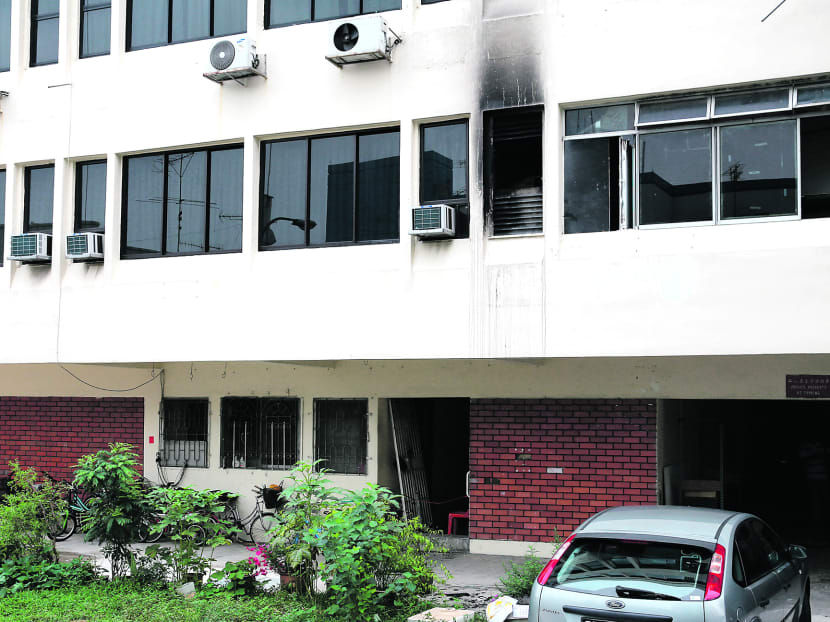Geylang apartment fire underscores dangers of illegal worker dorms: State Coroner
SINGAPORE — The Geylang apartment fire which took the lives of two Bangladeshi construction workers in April has put the spotlight on the dangers of housing workers in illegal premises, which may be lacking in “necessary and prudent safety measures”, said State Coroner Marvin Bay today (Oct 2), as he delivered his findings on the case.

Occupants were trapped in a fire at a private residence at Geylang Lorong 6 in April this year. TODAY file photo
SINGAPORE — The Geylang apartment fire which took the lives of two Bangladeshi construction workers in April has put the spotlight on the dangers of housing workers in illegal premises, which may be lacking in “necessary and prudent safety measures”, said State Coroner Marvin Bay today (Oct 2), as he delivered his findings on the case.
Another shophouse blaze in Geylang last December had left four foreign workers dead, he noted. “(The April) case... underscores yet again, the dangers inherent upon contractors emplacing their workers in such premises,” he said.
In the early hours of April 3, a fire had broken out in a second-floor apartment in a four-storey building at 86A Lorong 6 Geylang. The apartment had been modified into 12 rooms using partitions, and housed 34 foreign workers — mostly working in the construction industry. The Urban Redevelopment Authority had earlier noted that this was an unauthorised dormitor
Mr Bay concluded that 20-year-old Mamun Abdullah Ali and 22-year-old Hosen Ali, who were both employees at Prower Tech Engineering Services, had died from smoke inhalation.
The burnt remnants of a portable electrical outlet - which had a handphone charger connected to it - in one of the rooms was believed to be the source of the fire. Investigators from the Singapore Civil Defence Force (SCDF) also noted the practice of “daisy chaining” or linking numerous portable electrical outlets together in the apartment. Various electrical appliances - refrigerators, rice cookers, air-conditioning unit and handphone chargers - were connected to these outlets.
“There was a pervasive use of multi-way adaptors to accommodate their deployment. There was consequently a real risk of an electrical short circuit,” said Mr Bay. The plastic casing of these outlets, alongside with other combustibles in the room, were believed to have fuelled the fire.
“The cause of the death was established by the SCDF to be accidental in nature and of electric origin,” he said. “Tell-tale soot trails at gaps between the partition walls between (the two rooms)... showed that smoke and other combustion gases from the development of the fire would have been able to enter (the room of the two deceased) from the gaps.”
The two deceased, who had been asleep in the next room, were “oblivious to the impending jeopardy”, added Mr Bay. Mr Mamun, who was found on his bedroom floor, appeared to have woken up, only be to faint from the “toxic smoke”. Mr Hosen, on the other hand, was found in bed, having died in his sleep after inhaling the smoke.
Other occupants fled the unit from the main entrance or the window, after being awakened by the heat and smoke from the flames. Three sustained light injuries - either burns or sprains.
Mr Bay also noted: “Workers who are tempted to take up these accommodations should be made aware of the fact that these improvised dormitories may be illicitly and hastily set up, without the obtaining of proper prior approval, and without due or appropriate consideration of necessary and prudent safety measures that should be taken, in the event of a fire.”
Investigations showed that the apartment was owned by four landlords, who claimed that they were unaware of the modifications made to the premises. They had leased the unit to a main tenant, Mr Ho Kien Heng, last October. He later had difficulties paying the rent, and decided to lease the apartment to Mr Neo Wee Seng, a subtenant, two months later. Mr Ho stipulated that no more than eight occupants could stay here, in line with URA guidelines for rented residential properties.
Mr Neo, in turn, offered a Bangladeshi friend - Mr Jahir Raihan Billal Hossain - S$350 monthly to find tenants and manage the improvised dormitory. And while he knew that the apartment had been modified between last November and this February, he did not instruct Mr Jahir to remove the partitions. The Bangladeshi has since fled the country.






